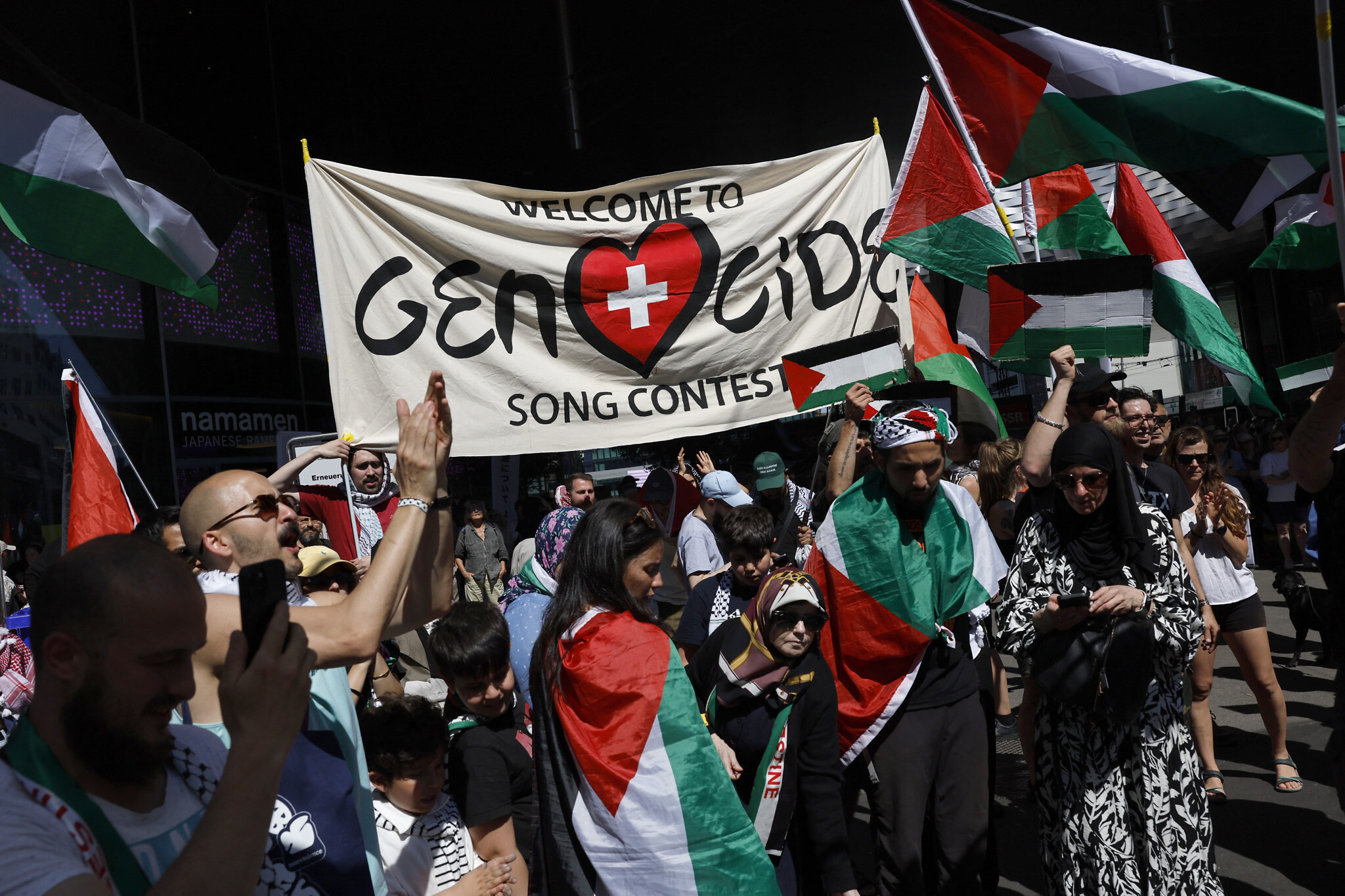This year’s Eurovision was supposed to be a celebration, of music, of unity, of campy madness and glittery joy. But if you watched closely, especially during the Israeli performance, you might’ve noticed something was off. Not with the vocals or choreography, but with the atmosphere.
Something stank. And we’re not just talking about taste in Europop.

“We’re Not Political” – Sure You’re Not
The European Broadcasting Union (EBU) loves to claim that Eurovision isn’t political. That it’s about the music. That everyone’s welcome. But if that’s true, why was Russia banned over Ukraine, yet Israel is allowed to participate during an ongoing assault in Gaza?
You can’t claim neutrality while making political choices. That’s not staying out of it, that’s picking a side and pretending you didn’t.
The message from Eurovision was clear: some wars disqualify you, others don’t. Some victims deserve solidarity, others just get silenced.
Protest? Not This Year.
Let’s talk about the flags.
Every year, the Eurovision stage is a riot of colour, a celebration of diversity. Pride flags, regional flags, banners from across Europe, they’re part of the vibe. But this year, the EBU limited flags to one per act. One national flag. Everything else, including the rainbow flag, was effectively banned.
Why? Because they didn’t want Palestinian flags on screen.
Instead of confronting the issue, they silenced all expression. And when protest erupted in the arena during Israel’s performance, the broadcast quietly turned the crowd mic down. The boos, the chants, the visible dissent? Scrubbed from the record.
So much for unity. So much for authenticity.
A Mixed Bag of Music – But Some Gems Shone Through
To be honest: musically, Eurovision 2025 wasn’t a vintage year. A lot of the entries felt safe, middle-of-the-road, or just a bit bland. But a few acts stood out, not just because they avoided the mess, but because they actually brought something interesting to the stage.
Germany: Abor & Tynna – “Baller”
This was my personal favourite. Abor & Tynna brought an effortlessly cool energy with Baller , a sleek German-language track mixing electro-pop and hip-hop. The performance was tight, stylish, and current. Tynna’s husky vocals cut through the noise, and the whole thing just had that “put this on a playlist” vibe. No gimmicks. No overproduction. Just a really solid song.
Luxembourg: Laura Thorn – “La Poupée Monte Le Son”
This one was pure charm. A playful, retro-flavoured French pop entry that felt like a nod to France Gall but with a wink to modern audiences. Laura Thorn was magnetic on stage, and while it might not have blown the roof off, it was one of the few performances that actually stuck in your head in a good way.
Austria: JJ – “Wasted Love”
The eventual winner, and deservedly so. Wasted Love started off interesting, a fusion of operatic vocals and dance beats, but it was the crescendo that brought it to the top tier for me. JJ’s voice soared, and when the beat finally dropped into full-blown techno-anthem mode, it hit like a wave. It was bold, dramatic, and totally different. Eurovision at its best.
This Isn’t About Yuval Raphael
I want to be absolutely clear: the Israeli performer, Yuval Raphael, doesn’t deserve hate. She’s just a young woman doing her job, representing her country at a global event. She didn’t cause this situation. She didn’t start a war.
And this isn’t a critique of her personally. But Eurovision is ultimately a song contest, and New Day Will Rise just wasn’t among the strongest entries. It didn’t leave a lasting impression. The controversy isn’t about her, it’s about how a fairly unremarkable song ended up ranked so highly in the televote, particularly in countries with strong pro-Palestinian sentiment.
The Televote That Doesn’t Pass the Sniff Test
In reality: Israel’s televote score just doesn’t add up.
Ireland gave them 10 points. The UK and Spain gave 12. These are countries where public protests in support of Palestine have been large, loud, and visible for months. That doesn’t align with the outcome.
There are widespread allegations of coordinated vote-boosting tactics:
- Using multiple SIM cards and burner credit cards
- Paid voting campaigns
- And possibly even bot farms
On top of that, Israel’s state broadcaster reportedly used public funds to promote the entry internationally, from ads on YouTube to targeted campaigns on TikTok and Instagram, and even billboards in Times Square. When you combine all that with a voting system vulnerable to abuse, the results start to feel a lot less like public opinion, and a lot more like manufactured consent.
Eurovision Should Know Better
Eurovision has always been more than just a song contest. It’s been a lifeline for LGBTQ+ communities, a celebration of minority voices, a place where protest and performance go hand in hand.
So when the EBU says “we’re not political” while:
- banning protest flags,
- muting real-time dissent,
- and platforming a state during a humanitarian crisis…
…it’s not neutrality. It’s cowardice. It’s complicity.
Final Thought
The issue here isn’t one artist or one song. It’s about what Eurovision wants to be.
If it wants to keep saying it’s about inclusion, it has to act like it. That means being honest about politics, and being brave enough to stand for something when it matters.
Because this year, Eurovision didn’t feel like a safe space. It felt like a stage-managed PR operation, one where protest was crushed, votes were manipulated, and the public was treated like fools.
We deserve better. So does the music.
Leave a Reply